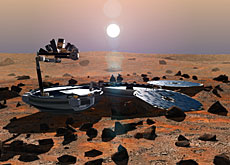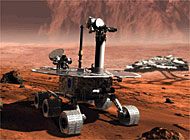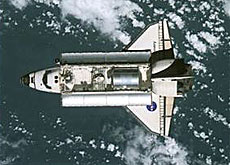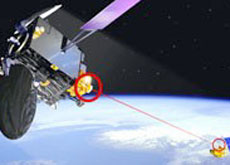Switzerland joins Europe’s first mission to Mars

The European Space Agency (ESA) has launched the first European mission to Mars to search for evidence of life on the red planet.
Switzerland is part of the Mars Express team and has contributed funding and key equipment to the mission.
The unmanned spacecraft blasted off on schedule from the space launch centre in Baikonur, Kazakhstan, on Monday.
Once on Mars, the craft will begin orbiting the planet. It is carrying a lander, which is due to touch down on the planet in late December.
The lander – called Beagle 2 after the ship which carried Charles Darwin to the Galapagos Islands – will then go about analysing matter from the planet’s surface.
It is equipped with cameras and a high-powered microscope developed by the University of Bern and a company based in Neuchâtel, called Space-X.
The main aim of the lander’s analysis is to determine whether there was ever liquid water on the Martian surface.
It will do this by analysing the internal composition of rocks to see whether they contain marked sedimentary layers – a key indicator that water once flowed on the planet.
Nicolas Thomas, a professor at Bern University and a member of the team involved in the Mars Express mission, told swissinfo that the presence of water would be an indicator that the planet could have once supported life.
“Water, we’re fairly certain, is a prerequisite for life,” Thomas said. “But simply because you detect that there has been liquid water on the surface at some time does not mean there is proof there was life.”
Swiss contribution
Switzerland is a founding member of the ESA and makes regular contributions – SFr125 million in 2002.
For the Mars Express mission, Bern University is responsible for monitoring the findings of the microscope. It will also analyse how fast oxygen is escaping the Martian atmosphere using special equipment on board the orbiter.
Thomas, who is involved with the microscope and its findings, says the aim of Mars Express is to build on findings from previous missions to Mars.
The microscope is far more powerful than those used on previous missions and the lander is also better equipped to analyse the composition of the planet.
“Previously, we’ve known that the surface of Mars is mostly composed of iron oxide: it’s rusting,” Thomas said. “But we still don’t know the exact mineralogical make up.”
Grand plan
Mars Express is part of a series of missions, planned with Nasa, which will continue until 2011. The aim is conduct increasingly detailed explorations of the planet.
Thomas says the ESA’s projects have to fall into line with those of Nasa because of budget constraints.
“Europe doesn’t have the financial muscle of Nasa,” he said. “The ESA’s space budget is around a seventh of Nasa’s budget, so we can’t put together such a detailed plan.”
Perhaps surprisingly, the ultimate aim of the Mars missions is not necessarily to put a man on the planet.
As Thomas explains, although it is feasible that a person may one day walk on Mars, the astronomical cost of carrying out the task (some estimates have put the cost at around €100 billion) could put some governments off.
It is also not clear whether a human being, with all the bacteria they carry on their body, might contaminate the planet, ruining future analysis of its surface.
swissinfo, Joanne Shields
The European Space Agency began its activities in 1975.
The agency has 15 member states, including Switzerland.
Switzerland is a founding member of the ESA.
The first Nasa spacecraft flew past Mars in 1965, taking close-up pictures of the planet.

In compliance with the JTI standards
More: SWI swissinfo.ch certified by the Journalism Trust Initiative




You can find an overview of ongoing debates with our journalists here. Please join us!
If you want to start a conversation about a topic raised in this article or want to report factual errors, email us at english@swissinfo.ch.